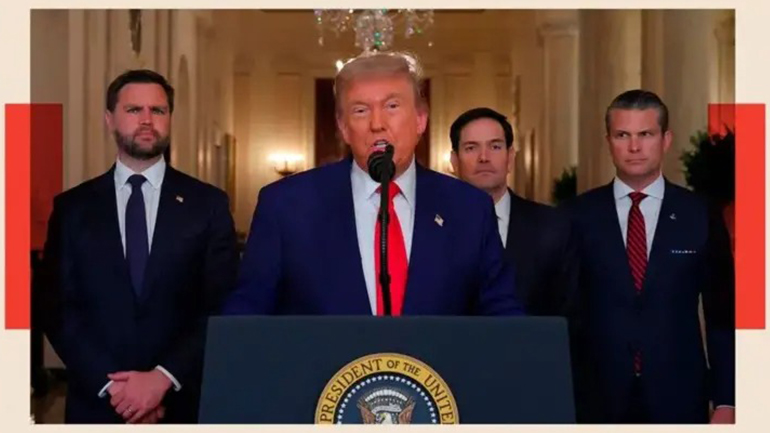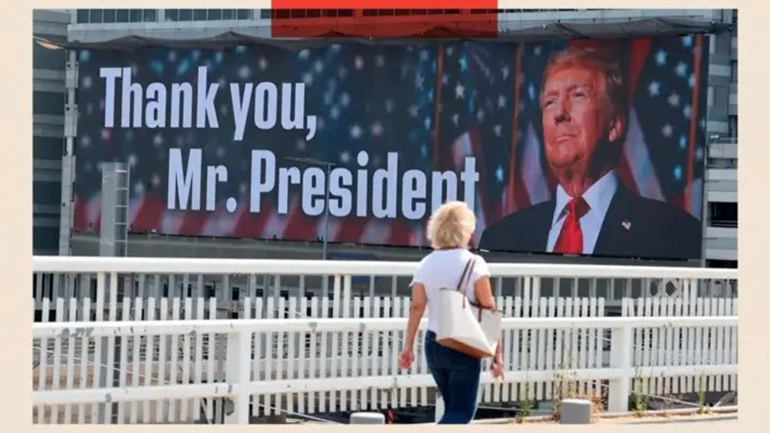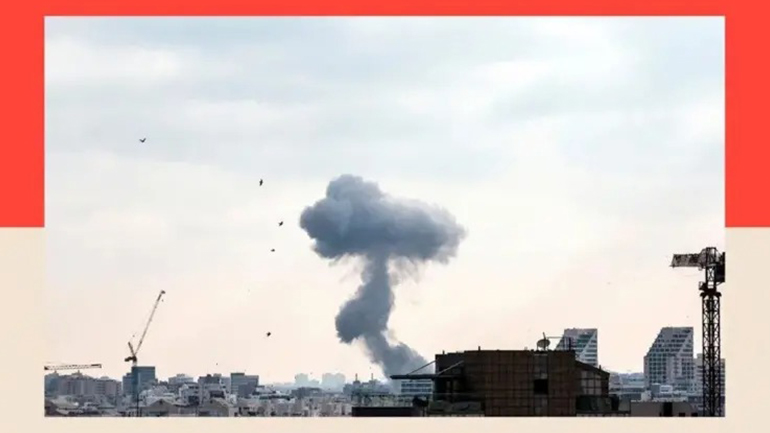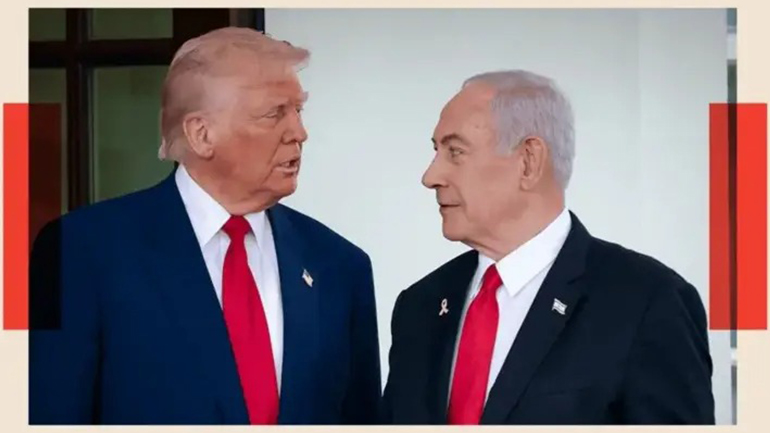Tensions between the United States and Iran are nothing new, but for decades, both countries have deliberately avoided crossing the dangerous red line of direct military confrontation. One after another, American presidents refrained from using military force against the Islamic Republic of Iran, fearing that the U.S. could be drawn into what might be the most dangerous war in the Middle East. But the president who came to the White House promising to be a messenger of peace has now crossed that red line by launching direct military strikes on Iran’s nuclear facilities. This decision is being regarded as the most consequential action of his second term, consistent with his reputation for breaking away from traditional norms. This is an unprecedented moment that has sent shockwaves through capitals worldwide. Iran’s next move could prove even more historic. Supreme Leader Ayatollah Ali Khamenei, reportedly now sheltering in a bunker, has for nearly four decades carefully followed a long-term military strategy to protect his most precious asset: the Islamic Republic. If he responds weakly to the U.S. airstrikes, it could lead to national embarrassment; if he responds too forcefully, it could risk losing everything. Sanam Vakil, Director of the Middle East and North Africa Program at Chatham House, says: “Khamenei’s next steps will not only determine his survival but also define his place in history.” “For him, this could be an even more bitter poison chalice than the one Khomeini accepted in 1988 when he agreed to a ceasefire in the Iran-Iraq War.”

US President Trump addresses the nation after the attack on Iran
'Iran does not want this war'
In the past ten days, Israeli airstrikes have caused more damage to Iran’s command-and-control systems and military infrastructure than Iran suffered during the eight-year Iran-Iraq War. That war still casts a long shadow over Iranian society. These Israeli attacks have killed senior Iranian security officials and prominent nuclear scientists. Now, with the United States' direct involvement, tensions have escalated even further. The Islamic Revolutionary Guard Corps (IRGC), formed after the 1979 Iranian Revolution, has threatened the U.S. with retaliation, warning that it will lead to “long-lasting regret.” Behind this war of words, however, lies a delicate balancing act aimed at avoiding catastrophic miscalculations. Hamid Reza Aziz of the Middle East Council for Global Affairs says, “Iran doesn’t want this war, but regardless of the actual damage caused by the U.S., pro-government voices are arguing that the blow to Iran’s image as a powerful regional force must be answered.” However, any form of retaliation is precarious. A direct strike on any of the nearly 20 U.S. military bases in the Middle East or on over 40,000 deployed American troops could invite a massive American military response. Closing the Strait of Hormuz — through which one-fifth of global oil trade passes — could backfire, alienating not only Arab allies but also China, Iran’s largest oil buyer. Western naval forces could also intervene to secure this vital chokepoint and prevent a global economic crisis. Moreover, Iran’s so-called “forward defense line” — its network of proxy groups in the region — has already been weakened or dismantled by Israel over the past 20 months of conflict. It remains unclear whether there exists any viable space for Iran to retaliate, restore its national pride, and then de-escalate without provoking an even harsher U.S. retaliation. This fragile dynamic has been tested before. Five years ago, when then-President Trump ordered a drone strike in Baghdad that killed IRGC commander Qassem Soleimani, fears of a broader war surged. Yet, Iran signaled its retaliation in advance through Iraqi intermediaries and targeted areas of U.S. bases where no casualties or major damage would occur. This time, however, the stakes are significantly higher.

Observers believe the US will exaggerate the attack.
'America did the diplomatic bloodshed, not Iran'
President Donald Trump repeatedly expressed a desire to reach an agreement with Iran rather than "open the gates of hell," but now he appears fully aligned with Israel. He has labeled Iran as the “bully of the Middle East,” determined to build a nuclear bomb, even though recent U.S. intelligence reports have not supported this claim. Now, intelligence teams are conducting a detailed assessment of what the Pentagon described as the “largest B-2 airstrike in U.S. history” to evaluate how effective it was. According to officials, the attack inflicted “severe damage” on Iran’s nuclear facilities in Natanz, Isfahan, and Fordow. The underground Fordow facility, located inside a mountain, could only be targeted using bunker-buster bombs. President Trump is now urging Iran to “choose the path of peace.” However, Iran views any diplomatic outreach from the U.S. as a form of surrender. On Friday in Geneva, Iranian Foreign Minister Abbas Araghchi met with his European counterparts. During the meeting, they delivered a firm message that Washington expects Tehran to completely halt its uranium enrichment program. This is a demand Iran flatly rejects, insisting that uranium enrichment is tied to its national sovereignty and forms a core component of its civilian nuclear program. Now, Iran views Trump’s diplomatic overtures — including five rounds of indirect talks led by his special envoy Steve Witkoff — as part of a complex deception rather than a genuine attempt at negotiation.
Meanwhile, Israel launched its military campaign against Iran just two days before the sixth round of negotiations was set to begin. The United States entered the conflict after President Donald Trump stated he wanted to give diplomacy a two-week window before escalating further. Now, Iran says it will not return to the negotiating table as long as the Israeli and American bombardments continue. Iranian Foreign Minister Abbas Araghchi, during a press conference in Istanbul, said, “It was not Iran but the United States that betrayed diplomacy.” At the same event, he met with foreign ministers from the 57 member countries of the Organization of Islamic Cooperation (OIC). The gathering condemned “Israeli aggression” and expressed “deep concern over the dangerous escalation” between the U.S. and Iran.

Smoke can be seen rising from Tel Aviv after the Iranian attack on June 22.
"Trump’s Strikes on Iran Backfire as Nuclear Tensions Escalate"
Iran has highlighted both the UN Charter and the warning issued by the International Atomic Energy Agency (IAEA), which states that nuclear facilities should not be targeted under any circumstances, "regardless of the situation." European leaders are also calling for immediate de-escalation and favor curbing Iran’s nuclear program through mediation rather than missile strikes. However, they continue to stress that Iran must not be allowed to acquire a nuclear bomb. For them, Iran enriching uranium up to 60% purity—dangerously close to the 90% weapons-grade threshold—is a troubling sign of its ambitions. Ellie Geranmayeh, Deputy Director of the Middle East and North Africa Programme at the European Council on Foreign Relations, notes: “Iran is likely to downplay the damage to its facilities and insist that its nuclear program remains intact despite these unprecedented strikes.” “On the other hand, the U.S. is expected to exaggerate the damage so that President Trump can claim a military victory without committing to further strikes.” Trump is caught between the pressure from Israeli Prime Minister Netanyahu, whose military is expected to continue its offensive to inflict maximum damage on Iran—likely provoking further Iranian retaliation—and pressure from U.S. lawmakers. At home, President Trump faces criticism from lawmakers who say he launched the strikes without congressional approval. Even some of his supporters argue that he has broken his promise to keep the U.S. out of long wars. This moment has forced Iran’s hardline leadership to focus on how to reestablish its deterrent power. Geranmayeh warns: “This is the greatest irony. While Trump aimed to eliminate the nuclear threat from Iran, he may have increased the likelihood of Iran becoming a nuclear state.”

US President faces pressure from Israeli Prime Minister
Powered by Froala Editor




